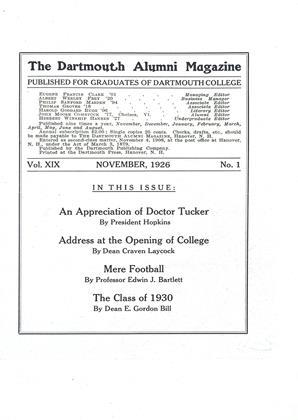W. O. Cross, a graduate of the University of Illinois, class of 1926, recently published a sweeping indictment of the co-educational system in colleges, tracing "evils" to the close association of sexes within the academic precincts. In reply to a questionnaire conducted by the Brooklyn (N.Y.) Eagle President Ernest Martin Hopkins, of Dartmouth, wrote as follows upon the subject: Editor Brooklyn Daily Eagle; I know nothing about the problems of coeducation except as I read about them in the magazines and in the daily press, and I have no opinion as to the merits of the different opinions which are published in regard to coeducation.
There is no question connected with education today that is not a problem, and I assume that co-education and the relation of the sexes in such a community is a problem.
However, I believe thoroughly that the crowning glory of the American educational system is its lack of standardization and the corollary of this, that almost all conceivable organizations and principles are being given trial and their results studied.
I should think that it was a loss to the public and a loss to our ultimate conclusions in regard to educational method if institutions historically and traditionally committed to co-education were to abandon their procedures at this particular stage of the experiment.
Personally, I do not believe that there is any tendency toward demoralization among the sexes present in co-educational institutions that originates there. Colleges and universities are in the large microcosms, and it is not to be expected that society in general can be distraught and befuddled about its code and its standards without having a reflection of this arise within college halls.
I have frequently quoted, among our own Dartmouth alumni, Huber's phrase which he used in connection with his description of the rise of the English universities, "Those were, in fact, scholastic colonies upon domain of common life."
That is the fact today, and be it for good or for ill, the formal institutions of learning are immediately and strongly affected by transformation of public thought in regard to its customs and usages.
I do not know anything in regard to the environment or the influences which have been at work upon Mr. Cross. I do know this, however, that in general the man just graduating from college has been altogether too busy laying the foundations of an education or zealously avoiding the necessity of doing this to give himself knowledge of the social background against which the college experiment is set.
I am not greatly impressed nor even greatly interested, therefore, in such an expression of sentiment or opinion as has emanated from Mr. Cross, however praiseworthy his own motives may have been.
(Signed) ERNEST M. HOPKINS.
 View Full Issue
View Full Issue
More From This Issue
-
 Sports
SportsMERE FOOTBALL
November 1926 By Professor Edwin J. Bartlett '72 -
 Lettter from the Editor
Lettter from the EditorEditorial Comment
November 1926 -
 Class Notes
Class NotesCLASS OF 1921
November 1926 By Herrick Brown -
 Class Notes
Class NotesCLASS OF 1911
November 1926 By Prof. Nathaniel G. -
 Article
ArticleTHE CLASS OF 1930
November 1926 By E. Gordon Bill -
 Class Notes
Class NotesCLASS OF 1917
November 1926 By Ralph Sanborn
Article
-
 Article
ArticleAlumni Leaders in Hopkins Center Project
November 1947 -
 Article
ArticleNine Other Programs This Summer Range from Executive Decision-Making to Russian
APRIL 1963 -
 Article
ArticleWilson Fellows
APRIL 1971 -
 Article
ArticleOther Sports
June 1962 By DAVE ORR '57 -
 Article
ArticleA Two-for-One- Convocation and the Med School's 200th
NOVEMBER 1996 By E. Wheelock -
 Article
ArticleLENDING NEIGHBORS A HAND
January 1936 By W. J. Minsch Jr. '36


